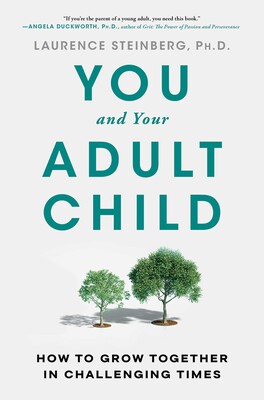Acclaimed Temple psychologist’s new book explores parenting adult children
Laurence Steinberg published his new book, You and Your Adult Child: How to Grow Together in Challenging Times, in April 2023. The book is a comprehensive guide for parents with adult children in their twenties or thirties.

How do I know if my adult child is struggling?
What should I do if I don’t like their romantic partner?
Should I lend them money for their new startup idea?
Can I give parenting advice to them?
An estimated 65 million American parents currently have a child in their 20s or 30s, and it turns out these parents have a lot of questions about navigating their relationships with their adult children. Earlier this year, Laurence Steinberg, a Temple psychology professor and leading international researcher on teen behavior and brain development, came to their rescue.
 Steinberg’s new book You and Your Adult Child: How to Grow Together in Challenging Times (Simon & Schuster), which was published in April, is a comprehensive guide for parents with adult children in their twenties or thirties.
Steinberg’s new book You and Your Adult Child: How to Grow Together in Challenging Times (Simon & Schuster), which was published in April, is a comprehensive guide for parents with adult children in their twenties or thirties.
To Steinberg’s knowledge, this is the first parenting book ever published that is specifically directed at parents of 20- and 30-year-olds, so it was important to him to be as comprehensive as possible. The book covers everything from maintaining healthy day-to-day relationships with an adult child, constructively resolving conflicts with them and supporting their mental health to assessing whether they are struggling, handling a variety of issues concerning their romantic lives, and finding the appropriate level of involvement in their college education.
There may be confusion, at first glance, about why an expert in adolescent development would be writing a book about managing relationships with adults in their twenties or thirties. But there is a connection between this slightly older demographic and Steinberg’s 45-year career studying adolescent development and behavior.
In Steinberg’s 2014 book, Age of Opportunity: Lessons From the New Science of Adolescence, he argued that adolescence—typically considered to end at age 19—was now elongating for many young adults to the age of 25. This is due, at least in part, to the changing economy that has made home ownership and financial independence a challenge for some young people in their twenties or thirties. As a result, some are finding themselves back at home with their parents or needing financial support from them. This is foreign territory to parents who had vastly different experiences when they were this age.
“Soon after publishing Age of Opportunity, it struck me that this elongation and lengthening of adolescence have implications for parents that haven’t really been discussed,” Steinberg said. This was reinforced by the increasing number of parents who would approach him after his public speaking events, desperate for more information about managing their relationships with their adult children.
Around the same time AARP, a nonprofit dedicated to enhancing quality of life for people 50 years old and over, also noticed a significant uptick in the number of questions they were receiving from their members about how to handle relationships with adult children in their twenties or thirties. To properly address their members’ concerns, AARP decided to encourage the development of a book, in partnership with Simon & Schuster, on the topic and started searching for an expert who could lead the project.
Suffice it to say, it didn’t take long to identify Steinberg as the expert for AARP and Simon & Schuster’s book project. About a year later, You and Your Adult Child was published. This new book combines his research and expertise in a way that provides parents of adult children with not only an understanding of what’s happening in their adult children’s brains during this critical moment in their lives, but also provides effective communication strategies that strengthen their relationship with their adult children.
“The conflicts over autonomy you and your child had when they were younger will dissipate once you both come to a new understanding about your relationship,” Steinberg says. “You’ll start seeing them in a different light and appreciate how mature they are.”
Steinberg’s hope is that his book helps parents learn to navigate this new landscape with their children in a healthy way, allowing all parties to deepen their appreciation for each other and enjoy this time together as adults.
“In exchange for being open, there’s a good possibility the two of you will develop a deeper friendship than you’ve ever had with them before,” Steinberg writes in his book. “Few people have known you for as long or as intimately as your child has, and few relationships have been as close. Now that you’ve let go of some of the prerogatives of parenthood, you’ll likely find your child to be a source of emotional support, a good listener, a good teacher who knows more than you do about many things, and a good companion.”


